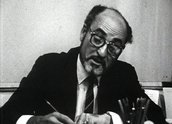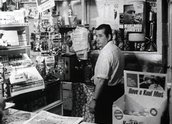


Bonjour Balwyn (1971)
Synopsis
Kevin Agar (John Duigan) has left a job in insurance to start his own magazine, called Bolo. His middle class parents don’t understand it, and very few people buy it. As his debts mount, Kevin loses his girlfriend, his friends and his secretary. Just when he hits rock bottom, he meets a television repairman (Peter Cummins) who needs a hand repossessing electrical goods. Kevin’s prospects begin to look brighter in the criminal world.
Curator’s notes
Nigel Buesst, in the late 1960s, was part of a loose group of aspiring filmmakers who are now called ‘the Carlton group’, after the suburb where most of them lived in Melbourne. Carlton at the time was a bohemian centre of inner Melbourne; there was an older bohemian community at Eltham, where Tim Burstall lived (but most of them were artists). Just how cohesive the Carlton group was is open to debate. Buesst himself has said the myth of collaboration between these filmmakers is a bit far-fetched. ‘We were mostly then, as now, egos bouncing around in opposition’, he said in 2003. Nevertheless, there were friendships and common influences, and these can be traced in many of the films made at the time. The French 'new wave’ had had a major impact; government film funding was yet to do so, but the determination to make something – anything – with a camera was very strong in a few people.
Buesst’s Bonjour Balwyn gives a glimpse of that determination at work. It was written by Buesst, playwright John Romeril (who plays Alan) and John Duigan, who became a successful Australian director in his later career (Flirting). It was shot by Tom Cowan (before he made The Office Picnic). The cast included Alan Finney (the writer with the moustache who buys the beer in clip two), who would go on to become a powerful figure in the industry as director of marketing at Village Roadshow. And the style of the film reflects a desire to create more open, organic films in which conventional plot, character development and psychology were jettisoned.
The film is not exactly drama, not simply comedy and more than a little influenced by documentary styles. Some of the dialogue is improvised and the camera is often allowed to run for long takes. The rhythm is more like daily life than constructed life – although Buesst’s sense of humour becomes more confident (and therefore structured) as the film develops. The last ten minutes of the film, as Kevin becomes enmeshed in the repossession business with Peter Cummins, leaves the viewer with a richly satirical observation on the realities of ‘cultural production’. Kevin discovers that slightly criminal work pays a lot better.
- Overview
- Curator’s notes
- Video 3 clips
- Principal credits
- Find a copy
- Make a comment
- Add your review



